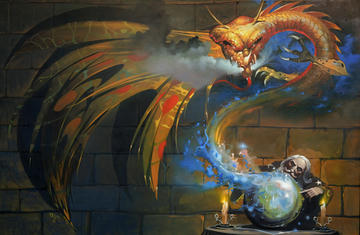Are gamebooks games or books?

I’ve been pondering writing a gamebook. Back in the eighties I was obsessed by them and played most of what was available. But to write one, I need to understand more about the medium itself.
What was it that I liked about them? What did I dislike? Mechanics were the biggest turn off for me, yet they are a defining part of what makes a game. This got me thinking: are gamebooks more game than book? Or is it the reverse?
All the gamebooks of the 80s and 90s had an array of mechanics for managing character creation, randomised encounters, skill tests, inventory management and combat. Often it was complex stuff and slowed down the experience of the adventure significantly.
Dave Morris recently wrote three very interesting posts about traditional mechanics in gamebooks, and asked the question: in a modern digital gamebook, is any of that stuff still necessary? You can read those posts here:
As a complete newbie to the world of writing gamebooks, these posts smashed my preconceptions of what a modern digital gamebook could be. My recent re-introduction to gamebooks turned me on to the idea of writing books in the classic mould of FF or Lone Wolf. I have fond memories of those books, but these days I find the game aspect curiously inept, over complex and often downright clumsy. In my day job, I design and engineer user interfaces for websites and apps, and much of the graft goes into making things simple. Gamebooks are often not simple. And getting simplicity right is hard.
Morris’s three posts came at the perfect time: It’s clear to me now that my own reservations about the old gamebook format are shared by many, and that there is plenty of scope to try something different. I subsequently discovered The Mysterious Path blog and the great thoughts of Grey Wiz. He’s been writing for a while about why gamebooks are broken, and many of his comments and ideas have also sparked my imagination. (Read his posts here: Game Mechanics.) All this reading made me realise I needed to re-address a basic question: what sort of gamebooks do I want to write?
What is a gamebook?
It seems a simple question to answer: a gamebook is an interactive story with integrated game systems presented as a book. Perhaps a question that’s harder to answer is:
What is the essence of a gamebook?
I think it comes down to whether you see the experience mainly as a game, or mainly as the story. As a kid, I played myriad gamebooks (all with different mechanics), but nearly all of them felt like the mechanics got in the way of the enjoyment of the actual story. I enjoyed solving puzzles and collecting items, but the main thing I loved about the books was the story: exploring a rich, mysterious world that unfolded with the decisions I made. When it came to combat, I mostly didn’t care; I’d skip the fight with a cheater’s win just so I could explore the rest of the story and the world.
Other players however may be the polar opposite of my tastes, and for them the gamebook experience may be all about winning, and not really about the story at all.
Understanding what makes the essence of a gamebook isn’t straight-forward: it’s almost entirely defined by the perspective of the player/reader.
Story or mechanics?
A common thread in the posts mentioned above has been this:
Modern gamebooks could be lighter on game, and heavier on the book: better narrative, interesting characters, compelling choices and genuinely emotional outcomes.
I wholeheartedly agree.
I read Stuart Lloyd’s great post about gamebook player types to help me better understand my own gamebook “tastes”. It turns out that I’m essentially a Storyteller, with a bit of Explorer and a large helping of Puzzle Solver. I couldn’t care less about being the Champion: clearly I’m not compelled by the traditional idea of “winning” so it’s no wonder the combat in gamebooks largely bored me.
As I’m much more interested in the story writing than creating wild and crazy game mechanics, I’ve decided to focus on story, characterisation and compelling player choices. I’ll still have some mechanics for managing inventory and suchlike, but they will be minimal.